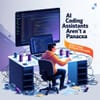AI coding assistants, like GitHub Copilot, are not the silver bullet for software development that many thought they'd be. A recent report reveals that these tools may actually decrease code quality instead of boosting it. This raises concerns about the potential consequences of relying too heavily on AI-generated code.
The issue lies in the fact that AI coding assistants might discourage developers from reusing existing, well-tested code, leading to a proliferation of new, potentially error-prone code. This decline in code reuse can result in software systems that are less robust, harder to maintain, and more prone to errors.
Moreover, developers are spending more time debugging code generated by AI assistants than code written by humans. This suggests that while AI might produce code quickly, the quality and potential for introducing subtle bugs could offset the initial time savings.
To truly unlock the potential of AI in software development, the focus should shift from accelerating coding time to improving the way engineers access and manage information. This includes developing tools that make it easier to find, understand, and share information, such as better documentation, knowledge-sharing platforms, and systems that map out dependencies.
Ultimately, AI coding assistants are not a replacement for human developers, but rather a tool that can augment their capabilities. By understanding the strengths and limitations of these tools, developers can use them strategically to improve productivity and code quality.


